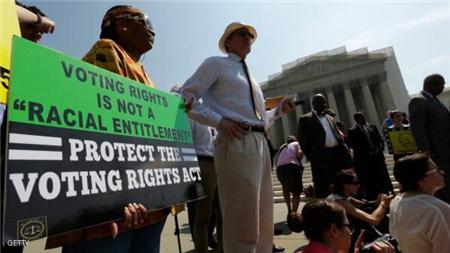
Act was dismantled by the Supreme Court but many Justices have grave reservations and regrets Voting Rights Act end | Democracy, elections, and voting
In a new post at Election Law Blog, written by election expert Rick Hasen, “The Court & the Right to Vote: A Dissent”, we learn more about the internal differences that underlie the Supreme Court’s decision to dismantle the Voting Rights Act. Justice Stevens is speaking out:
Must-read review by Justice Stevens of Gary May’s new book on the Voting Rights Act. While partially a review of May’s book, it is also an endorsement of Justice Ginsburg’s dissent, and critique of the Chief Justice’s majority opinion, in the Shelby County case striking down a key part of the Voting Rights Act.
From the book review:
May’s eminently readable book is particularly timely because the Supreme Court, on June 25, 2013, issued its decision in Shelby County v. Holder, invalidating the portion of the 2006 enactment that retained the formula used in the 1965 act to determine which states and political subdivisions must obtain the approval of the Department of Justice, or the US District Court in the District of Columbia, before changes in their election laws may become effective. That formula imposed a “preclearance” requirement on states that had maintained a “test or device” as a prerequisite to voting on November 1, 1964, and had less than a 50 percent voter registration or turnout in the 1964 presidential election. Alabama, where Shelby County is located, is one of those states. Over the dissent of Alabama-born Justice Hugo Black, the Court had upheld the preclearance provision shortly after the VRAwas enacted in 1966 in South Carolina v. Katzenbach.
Also, here is some information from the book description found on Amazon:
When the Fifteenth Amendment of 1870 granted African Americans the right to vote, it seemed as if a new era of political equality was at hand. Before long, however, white segregationists across the South counterattacked, driving their black countrymen from the polls through a combination of sheer terror and insidious devices such as complex literacy tests and expensive poll taxes. Most African Americans would remain voiceless for nearly a century more, citizens in name only until the passage of the 1965 Voting Rights Act secured their access to the ballot.
In Bending Toward Justice, celebrated historian Gary May describes how black voters overcame centuries of bigotry to secure and preserve one of their most important rights as American citizens. The struggle that culminated in the passage of the Voting Rights Act was long and torturous, and only succeeded because of the courageous work of local freedom fighters and national civil rights leaders—as well as, ironically, the opposition of Southern segregationists and law enforcement officials, who won public sympathy for the voting rights movement by brutally attacking peaceful demonstrators. But while the Voting Rights Act represented an unqualified victory over such forces of hate, May explains that its achievements remain in jeopardy. Many argue that the 2008 election of President Barack Obama rendered the act obsolete, yet recent years have seen renewed efforts to curb voting rights and deny minorities the act’s hard-won protections.
Leave a Reply